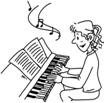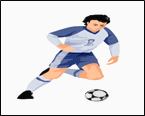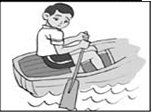题目内容
听力理解(共24分)
一、听对话,从下面各题所给的A、B、C三幅图片中选择与对话内容相符的图片。每段对话读两遍。(共4分,每小题1分)
1.
A.
B.
C.
2.
A.
B.
C.
3.
A.
B.
C.
4.
A.
B.
C.
二、听对话,根据对话内容,从下面各题所给的A、B、C三个选项中选择最佳选项。每段对话读两遍。(共12分,每小题1分)
请听一段对话,完成第5至第6小题。
5.When did the man move to the new house?
A.Last winter.
B.Last summer.
C.Last spring.
6.Why did the man move to the new house?
A.His old house was far from his children’ s school.
B.He wanted to live near a bookshop.
C.His neighbour was too noisy.
请听一段对话,完成第7至第8小题。
7.Where will the man park his car?
A.Inside the building.
B.Behind the building.
C.In front of the building.
8.How often is the rubbish collected?
A.Once a day.
B.Twice a day.
C.Three times a day.
请听一段对话,完成第9至第11小题。
9.What does the woman want to do?
A.Have a short tour in London.
B.Go to the Hyde Park Hotel.
C.Find the way to the British Museum.
10.When can the woman visit London Tower?
A.In the morning.
B.Right after lunch.
C.In the afternoon.
11.How much will the woman pay if she goes with her family?
A.15 pounds.
B.30 pounds.
C.45 pounds.
请听一段对话,完成第12至第13小题。
12.What does the woman advise the man to do?
A.Wait until she’s finished the magazine.
B.Buy a copy of the magazine.
C.Read the magazine online.
13.From the text we know that the magazine will get _________.
A.more popular
B.more expensive
C.more special
请听一段对话,完成第14至第16小题。
14.Where is the man from?
A.Britain.
B.Australia.
C.Italy.
15.How many kinds of sport does Mark like?
A.Two.
B.Three.
C.Four.
16.What can we learn from the dialogue?
A.Mark shares the same favorite sport with his family.
B.Swimming is the most popular sport in Mark’s family.
C.Mark and his family are all sport lovers.
三、听一段独白,根据所听到的内容和提示词语,记录关键信息。独白读两遍。(共8分,每小题2分)

解析:
|
答案:B C A C A C B B A A C C B A B C 7∶30 Sunday(s) living room pet 听力录音稿 Text 1 M:Amy, hurry up, or you’ll be late. W:Dad, I can’t find my shoes. Text 2 M:Hi, Mary.How is everything? W:Not good, I’ve got a toothache. Text 3 M:Which do you prefer, collecting stamps or painting? W:Painting.I think it’s more creative. Text 4 W:Can I have a look at your new mobile phone, Jack? M:Sure, here you are. Text 5 W:I’ve heard that you have moved into a new house, Bill. M:That’s right.We moved in last winter. W:Why did you choose that place? It’s far from your children’s school. M:We had to move.You know, our neighbour was too noisy.He often asked some friends to his house and had parties at home, singing and dancing until midnight.We couldn’t sleep at all. W:That’s really too bad.How’s your new house? M:It’s good.We live next to a bookshop.It’s quiet in the evening. Text 6 M:Excuse me, I’m new in this building.Could I ask you some of the rules here? W:Yes, of course. M:First, about the parking.Is it OK to leave my car behind the building? W:Sure.You’ll see some parking spaces there for the people living in this building. M:And what about when I have guests? W:Well, guests aren’t allowed to leave their cars in the back.They have to park their cars in the guest parking area in the front. M:I see.What about the rubbish? W:It has to be taken to the ground floor.It’s collected twice a day, at 8:00 am and 7:00 pm. M:All right, fine.And do I have to use those special plastic bags for the rubbish? W:No, that’s not necessary.You can use the paper ones you get from the supermarket. M:Thank you very much. Text 7 M:May I help you? W:Yes, I’d like to know about a one-day sightseeing tour around town. M:We have several.Would you tell me where you want to go? W:British Museum and Tower of London are my favorites.Do you have any tours that include both of them? M:Yes, this one.You visit London Tower and Westminster Abbey in the morning.Right after lunch, the tour makes a stop at St.Paul’s.The rest of the afternoon is spent at the museum. W:How long does the tour take? M:About seven hours.Where are you staying? W:At the Hyde Park Hotel. M:Let’s see.The bus stops there at 9∶30.You should be back by 5∶30 in the afternoon. W:How much should I pay if I go with my husband and daughter? M:It’s 15 pounds for each person, including lunch. W:Thanks very much.I’ll think about it. Text 8 W:Have you seen the new Cosmo magazine that I bought? M:I saw it on the kitchen table. W:There’s an interesting interview with a popular director about his latest film that I want to finish.It’s Martin Scorsese.You liked his film, The Departed, didn’t you? M:Yes, it was fantastic! Can I read the article when you’ve finished? W:Sure.You know it has an online edition, too.You could go online to read it. M:Well, OK.By the way, do you buy the magazine regularly? W:Yes. M:How much does the magazine cost? W:It’s £3 now, and I’ve heard they’re going to raise the price to £5 soon next month.I think few people would buy it if the price went up to £5. M:I bet you’d still buy it.You wouldn’t be able to live without your fashion magazine! Text 9 W:Today in the studio we’re talking to Mark Cavalcani.And he’s going to be in a big tennis match coming up in Australia.Mark, good morning. M:Good morning. W:Now Mark, your family name’s interesting. M:That’s right.My grandfather’s Italian.But my parents grew up here in Britain so I’m British. W:And is tennis the only sport in your life? M:No, not at all.I love swimming, it’s great exercise.I like basketball, too.I sometimes play on a local team, but my first love is tennis. W:Are there any other tennis players in your family? M:No, not really.My mother Helen often goes climbing on weekends.And then there’s Anna, my sister.She’s 13 and she’s really good at running. W:Thank you, Mark.I hope you had a good time with us. M:Sure.I’m glad to be here. Text 10 W:OK, John.Welcome to our home.And here’s something I want to tell you first.Breakfast is from 7∶30.Anytime is OK.We always have dinner at 6∶30, though, so please don’t be late.I won’t clean your room, so you have to keep your room tidy, but I’ll wash your sheets once a week.You’ll have clothes to wash, so you can do your washing on Sundays.Er, what else? The phone in your room can only be used for answering calls.You can use the phone in the living room for local calls, OK? There’s a pay phone at the end of the street.You can use that to phone home.By the way, you can’t smoke or keep a pet in your room.Oh, and here’s your key, please come back home before midnight.All right, I think that’s everything.If you have any problems, you can always come to me for help. |

 阅读快车系列答案
阅读快车系列答案

















































